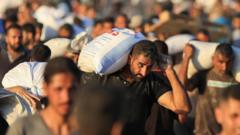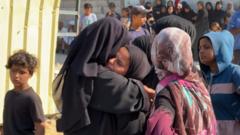The humanitarian crisis in Gaza deepens, with malnutrition deaths rising amid a blockade and lack of aid. As fighting continues, tensions escalate regarding international responses and the future of humanitarian support.
Malnutrition Crisis Escalates in Gaza Amid Ongoing Conflict

Malnutrition Crisis Escalates in Gaza Amid Ongoing Conflict
Seven additional fatalities from malnutrition reported as humanitarian conditions in Gaza worsen amidst the Israel-Hamas war.
In the Gaza Strip, the dire situation has taken a tragic turn as the Hamas-run health ministry reported seven new malnutrition-related deaths within just 24 hours, bringing the total to 154 since the Israel-Hamas conflict erupted. Alarmingly, 89 of these casualties are children. The United Nations' food security experts have highlighted that Gaza is currently facing a worst-case famine scenario, intensifying concerns over the humanitarian response amidst escalating violence.
Israel maintains that it is not hindering aid flows into Gaza, a claim that has been met with skepticism by European allies, the UN, and various NGOs working in the region. This crisis unfolds as US special envoy Steve Witkoff prepares to visit Israel to address the ongoing humanitarian issues.
Additionally, reports from Gaza hospitals indicate that six Palestinians were killed near a Humanitarian Foundation aid distribution center in Rafah when crowds surged toward the facility before its opening. Palestinian sources allege that Israeli tanks opened fire, while the Israel Defense Forces (IDF) stated that their forces acted in response to perceived threats, underscoring the tensions surrounding aid distribution efforts.
On Wednesday, the Hamas health ministry also reported 103 deaths in a single day, with a significant number of individuals perish due to seeking aid. Since Israel reinstituted a blockade on March 1—aimed at compelling Hamas to release hostages—the critical shortages of food, medicine, and fuel have dramatically worsened, leading to dire warnings from global food security experts.
The escalation of hostilities began following a Hamas attack on southern Israel on October 7, 2023, which resulted in devastation, including the deaths of approximately 1,200 people and over 250 hostages taken. In stark contrast, Hamas estimates that around 60,138 Palestinians have died due to the subsequent Israeli military campaign.
Further complicating matters, Israeli Prime Minister Benjamin Netanyahu has reacted strongly against British Prime Minister Sir Keir Starmer’s proposal to recognize a Palestinian state unless Israel complies with a ceasefire and revives a two-state framework. Netanyahu criticized the UK's approach as a concession to "Hamas' monstrous terrorism." This geopolitical tension hints at the broader implications of the conflict and the urgent need for a viable humanitarian solution.
Israel maintains that it is not hindering aid flows into Gaza, a claim that has been met with skepticism by European allies, the UN, and various NGOs working in the region. This crisis unfolds as US special envoy Steve Witkoff prepares to visit Israel to address the ongoing humanitarian issues.
Additionally, reports from Gaza hospitals indicate that six Palestinians were killed near a Humanitarian Foundation aid distribution center in Rafah when crowds surged toward the facility before its opening. Palestinian sources allege that Israeli tanks opened fire, while the Israel Defense Forces (IDF) stated that their forces acted in response to perceived threats, underscoring the tensions surrounding aid distribution efforts.
On Wednesday, the Hamas health ministry also reported 103 deaths in a single day, with a significant number of individuals perish due to seeking aid. Since Israel reinstituted a blockade on March 1—aimed at compelling Hamas to release hostages—the critical shortages of food, medicine, and fuel have dramatically worsened, leading to dire warnings from global food security experts.
The escalation of hostilities began following a Hamas attack on southern Israel on October 7, 2023, which resulted in devastation, including the deaths of approximately 1,200 people and over 250 hostages taken. In stark contrast, Hamas estimates that around 60,138 Palestinians have died due to the subsequent Israeli military campaign.
Further complicating matters, Israeli Prime Minister Benjamin Netanyahu has reacted strongly against British Prime Minister Sir Keir Starmer’s proposal to recognize a Palestinian state unless Israel complies with a ceasefire and revives a two-state framework. Netanyahu criticized the UK's approach as a concession to "Hamas' monstrous terrorism." This geopolitical tension hints at the broader implications of the conflict and the urgent need for a viable humanitarian solution.




















